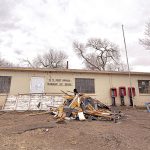
Hardship office overwhelmed, understaffed, underpaid
WINDOW ROCK
Despite the millions of dollars that were given to the executive branch to administer federal funds, the Navajo Nation Council learned on Monday that the controller’s office is woefully understaffed and unable to keep up with magnitude of problems – and inquiries – associated with the ARPA Hardship Assistance program.
All of this is causing confusion, if not chaos, for those who have not received hardship checks or are trying to resolve outstanding application issues.
During her report to the spring session on Monday, Acting Controller Elizabeth Begay was bombarded with questions from delegates about why their phones have been ringing off the hook with complaints from constituents trying to get updates on Hardship checks with no response.
Foremost, delegates grilled Begay about people calling the Hardship Assistance phone lines and emailing but getting no answer or response.
“Our people are reaching out to us – they’re very concerned that they’re trying to contact your office, but your phones are always busy,” said Delegate Rickie Nez.
“We have constituents who are trying to get an update and I know they’ve called multiple times, so I’m wondering, what is your plan as far as assisting with these concerns?” asked Delegate Charlaine Tso.
‘Not able’ to answer calls
In short, Begay explained that her staff of 20 people on the Hardship team simply cannot keep up with responding to the thousands of calls and emails they have been receiving from applicants on a daily basis.
“We get so many calls – one time we got 14,000 calls in one day – so definitely we’re not able to answer all the calls,” said Begay. “We’re doing our best, but we’re overwhelmed and short-staffed.”
Delegate Kee Begay asked why, with an $180 million allocation for administration of American Rescue Plan Act funds to the executive branch, Begay was not able to hire more staff for the Hardship team.
She responded that because the rate of pay is so low – $13.18 per hour – they are having a hard time attracting the office specialists they need.
“We have the funding to hire additional workers,” said Begay. “It’s just there’s not that many applicants for the office specialist that we need for the temporary hardship staff.”
Exasperated, Delegate Amber Kanazbah Crotty asked why Begay hadn’t contracted out some of the Hardship assistance processing duties.
“There are Navajo accounting firms out there that could assist?” said Crotty.
Begay answered that it was decided to keep the Hardship work all in-house in order to save money.
The accounting firm Baker Tilly that helped administer the CARES Act Hardship Assistance last year was paid $14 million for their services, she said.
Begay added her staff had to do “a lot of clean up” on the Baker Tilly portal that was returned to the Navajo Nation because it had a lot of missing information.
Delegates implored Begay, who reports to President Jonathan Nez, to improve customer service and communication with the public about what is going on with the hardship checks.
“You work under the direction of the executive branch and our Navajo people deserve that communication,” Kee Allen Begay said.
A request from the Navajo Times to Begay and president’s office Communications Director Jared Touchin on Tuesday as to whether they will be issuing a press release did not receive a response.
The controller’s office also never hired its own ARPA public information officer.
‘Lines are long’
The good news is that as of April 1, a total of 304,137 enrolled Navajos were paid $507.5 million of the $557 million of ARPA funds appropriated by the Council for Hardship Assistance.
The bad news is that about 10,000 of those checks have been returned by the U.S. Post Office, according to Begay.
Begay explained many checks were returned because Hardship recipients were not the registered post office box holder or there was some other error with their address.
She took the opportunity to recommend the Navajo government work on rural addressing to improve the mail delivery system.
In addition to the problems with mailing addresses, Begay explained that there are “thousands” of people with duplicate Certificates of Indian Blood who have not received their ARPA checks because they can’t issue two checks on the same CIB.
“They might not know they were sharing a CIB with another individual,” she said. “We’re working closely with Vital Records to resolve this issue.”
This is why the controller’s office began distributing returned checks at the five agency locations last week, beginning at Tuba City Chapter and the controller’s office in Window Rock for Fort Defiance Agency (see below), which has also created a bottleneck of long lines of people waiting outdoors to pick up checks or have concerns addressed.
Delegate Otto Tso suggested to Begay that her office should at least provide porta-potties in the areas where people are waiting in line so they don’t have to lose their place to go to the bathroom.
“The lines are long,” said Tso.
‘Skipped over’
Begay said she also wants to post the CIB numbers for all of the returned checks by chapter or agency and they’re working to do this with the Department of Justice so they can get ahold of the recipients to arrange to pickup of the checks.
Delegate Rickie Nez suggested the controller’s office should provide weekly updates to chapters with the latest information on Hardship checks and what numbers they should call for updates.
“The chapter officials are pretty good at distributing information to their local community members, so it would be great that your office sends this updated information to the chapters,” he said.
Nez and several other delegates also said that unfortunately there is a lot of “misinformation” floating around because of the lack of communication from her office.
“Some people feel like they were skipped over,” he said. “They feel like the checks were already distributed and they got nothin’.”
Delegate Charlaine Tso recommended to Begay that the Hardship team set up at the chapters on a regular basis to assist people, not just for a couple of days.
Begay responded that they are considering assigning a Hardship worker at each agency office fulltime.
In the meantime, Begay said because of the long lines at her office at Administration Building 1 in Window Rock, on Tuesday they were moving the Hardship operation to the Sports Center at the Navajo Nation fairgrounds.
“We will be doing the check distribution at the Sports Center, where there’s a big parking space,” said Begay. “That will eliminate people standing in the heat – they can wait in their own vehicle.”
She is inviting the Vital Records office to join them as well so that those that have issues with CIB can be helped as well.
Begay said anyone from any agency can come to the Window Rock fairground Sports Center in Window Rock to pick up their returned checks.
“They don’t have to wait for the agency distribution,” she said.
However, no information about the operating hours at the Sports Center have been shared with the public and Begay did not respond to a request for that information by press time.
The Hardship team is also calling people who live off reservation whose checks have been returned in order to make arrangements for pickup and they will be bringing “urban” returned checks to the upcoming Hardship technical assistance drives in Phoenix and Denver.
The next challenge on the horizon is that the controller’s office only budgeted for 345,000 check recipients and there are now an estimated 411,000 enrolled Navajos, with more enrolling every day to apply for Hardship payments.
This means that the Navajo Nation Council will have to allocate more funding to cover the impending deficit in Hardship funding, which will also take time, meaning more delays for recent applicants.
As a public service, the Navajo Times is making all coverage of the coronavirus pandemic fully available on its website. Please support the Times by subscribing.
How to protect yourself and others.
Why masks work. Which masks are best.
Resources for coronavirus assistance








 Highway 264,
Highway 264, I-40, WB @ Winslow
I-40, WB @ Winslow